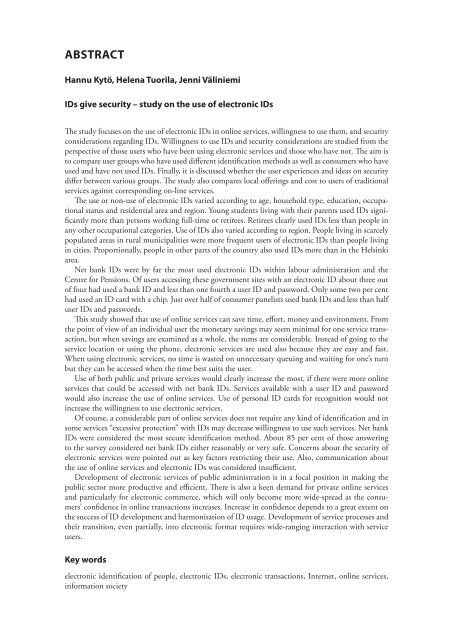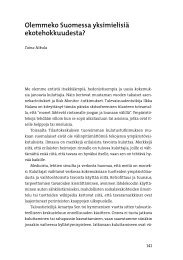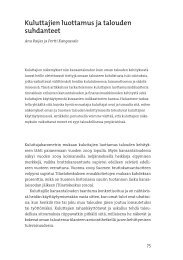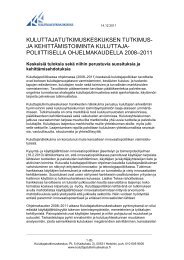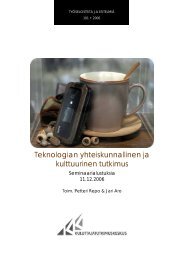Tunnisteilla turvallisuutta â tutkimus sähköisten tunnisteiden käytöstä
Tunnisteilla turvallisuutta â tutkimus sähköisten tunnisteiden käytöstä
Tunnisteilla turvallisuutta â tutkimus sähköisten tunnisteiden käytöstä
Create successful ePaper yourself
Turn your PDF publications into a flip-book with our unique Google optimized e-Paper software.
Abstract<br />
Hannu Kytö, Helena Tuorila, Jenni Väliniemi<br />
IDs give security – study on the use of electronic IDs<br />
The study focuses on the use of electronic IDs in online services, willingness to use them, and security<br />
considerations regarding IDs. Willingness to use IDs and security considerations are studied from the<br />
perspective of those users who have been using electronic services and those who have not. The aim is<br />
to compare user groups who have used different identification methods as well as consumers who have<br />
used and have not used IDs. Finally, it is discussed whether the user experiences and ideas on security<br />
differ between various groups. The study also compares local offerings and cost to users of traditional<br />
services against corresponding on-line services.<br />
The use or non-use of electronic IDs varied according to age, household type, education, occupational<br />
status and residential area and region. Young students living with their parents used IDs significantly<br />
more than persons working full-time or retirees. Retirees clearly used IDs less than people in<br />
any other occupational categories. Use of IDs also varied according to region. People living in scarcely<br />
populated areas in rural municipalities were more frequent users of electronic IDs than people living<br />
in cities. Proportionally, people in other parts of the country also used IDs more than in the Helsinki<br />
area.<br />
Net bank IDs were by far the most used electronic IDs within labour administration and the<br />
Centre for Pensions. Of users accessing these government sites with an electronic ID about three out<br />
of four had used a bank ID and less than one fourth a user ID and password. Only some two per cent<br />
had used an ID card with a chip. Just over half of consumer panelists used bank IDs and less than half<br />
user IDs and passwords.<br />
This study showed that use of online services can save time, effort, money and environment. From<br />
the point of view of an individual user the monetary savings may seem minimal for one service transaction,<br />
but when savings are examined as a whole, the sums are considerable. Instead of going to the<br />
service location or using the phone, electronic services are used also because they are easy and fast.<br />
When using electronic services, no time is wasted on unnecessary queuing and waiting for one’s turn<br />
but they can be accessed when the time best suits the user.<br />
Use of both public and private services would clearly increase the most, if there were more online<br />
services that could be accessed with net bank IDs. Services available with a user ID and password<br />
would also increase the use of online services. Use of personal ID cards for recognition would not<br />
increase the willingness to use electronic services.<br />
Of course, a considerable part of online services does not require any kind of identification and in<br />
some services “excessive protection” with IDs may decrease willingness to use such services. Net bank<br />
IDs were considered the most secure identification method. About 85 per cent of those answering<br />
to the survey considered net bank IDs either reasonably or very safe. Concerns about the security of<br />
electronic services were pointed out as key factors restricting their use. Also, communication about<br />
the use of online services and electronic IDs was considered insufficient.<br />
Development of electronic services of public administration is in a focal position in making the<br />
public sector more productive and efficient. There is also a keen demand for private online services<br />
and particularly for electronic commerce, which will only become more wide-spread as the consumers’<br />
confidence in online transactions increases. Increase in confidence depends to a great extent on<br />
the success of ID development and harmonisation of ID usage. Development of service processes and<br />
their transition, even partially, into electronic format requires wide-ranging interaction with service<br />
users.<br />
Key words<br />
electronic identification of people, electronic IDs, electronic transactions, Internet, online services,<br />
information society


